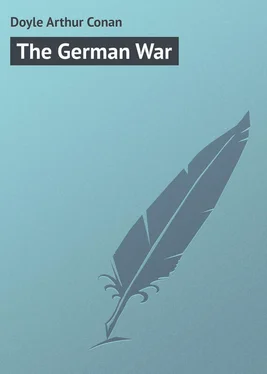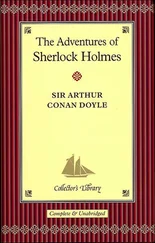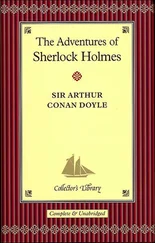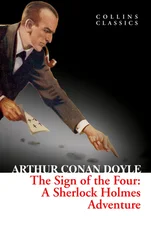Arthur Doyle - The German War
Здесь есть возможность читать онлайн «Arthur Doyle - The German War» — ознакомительный отрывок электронной книги совершенно бесплатно, а после прочтения отрывка купить полную версию. В некоторых случаях можно слушать аудио, скачать через торрент в формате fb2 и присутствует краткое содержание. Жанр: foreign_prose, на английском языке. Описание произведения, (предисловие) а так же отзывы посетителей доступны на портале библиотеки ЛибКат.
- Название:The German War
- Автор:
- Жанр:
- Год:неизвестен
- ISBN:нет данных
- Рейтинг книги:4 / 5. Голосов: 1
-
Избранное:Добавить в избранное
- Отзывы:
-
Ваша оценка:
- 80
- 1
- 2
- 3
- 4
- 5
The German War: краткое содержание, описание и аннотация
Предлагаем к чтению аннотацию, описание, краткое содержание или предисловие (зависит от того, что написал сам автор книги «The German War»). Если вы не нашли необходимую информацию о книге — напишите в комментариях, мы постараемся отыскать её.
The German War — читать онлайн ознакомительный отрывок
Ниже представлен текст книги, разбитый по страницам. Система сохранения места последней прочитанной страницы, позволяет с удобством читать онлайн бесплатно книгу «The German War», без необходимости каждый раз заново искать на чём Вы остановились. Поставьте закладку, и сможете в любой момент перейти на страницу, на которой закончили чтение.
Интервал:
Закладка:
So far all had worked well for German plans. Those of the British public who were familiar with the past and could look into the future might be well aware that our interests were firmly bound with those of France, and that if our faggots were not tied together they would assuredly be snapped each in its turn. But the unsavoury assassination which had been so cleverly chosen as the starting-point of the war bulked large in the eyes of our people, and, setting self-interest to one side, the greater part of the public might well have hesitated to enter into a quarrel where the cause seemed remote and the issues ill-defined. What was it to us if a Slav or a Teuton collected the harbour dues of Salonica! So the question might have presented itself to the average man who in the long run is the ruler of this country and the autocrat of its destinies. In spite of all the wisdom of our statesmen, it is doubtful if on such a quarrel we could have gained that national momentum which might carry us to victory. But at that very moment Germany took a step which removed the last doubt from the most cautious of us and left us in a position where we must either draw our sword or stand for ever dishonoured and humiliated before the world. The action demanded of us was such a compound of cowardice and treachery that we ask ourselves in dismay what can we ever have done that could make others for one instant imagine us to be capable of so dastardly a course? Yet that it was really supposed that we could do it, and that it was not merely put forward as an excuse for drawing us into war, is shown by the anger and consternation of the Kaiser and his Chancellor when we drew back from what the British Prime Minister has described as “an infamous proposal.” One has only to read our Ambassador’s description of his interview with the German Chancellor after our decision was announced, “so evidently overcome by the news of our action,” to see that through some extraordinary mental aberration the German rulers did actually believe that a vital treaty with Britain’s signature upon it could be regarded by this country as a mere “scrap of paper.”
What was this treaty which it was proposed so lightly to set aside? It was the guarantee of the neutrality of Belgium signed in 1839 (confirmed verbally and in writing by Bismarck in 1870), by Prussia, France, and Britain, each of whom pledged their word to observe and to enforce it. On the strength of it Belgium had relied for her security amidst her formidable neighbours. On the strength of it also France had lavished all her defences upon her eastern frontier, and left her northern exposed to attack. Britain had guaranteed the treaty, and Britain could be relied upon. Now, on the first occasion of testing the value of her word it was supposed that she would regard the treaty as a worthless scrap of paper, and stand by unmoved while the little State which had trusted her was flooded by the armies of the invader. It was unthinkable, and yet the wisest brains of Germany seem to have persuaded themselves that we had sunk to such depths of cowardly indolence that even this might go through. Surely they also have been hypnotised by those foolish dreams of Britain’s degeneration, from which they will have so terrible an awakening.
As a matter of fact, the General Staff had got ahead of the diplomatists, and the German columns were already over the border while the point was being debated at Berlin. There was no retreat from the position which had been taken up. “It is to us a vital matter of strategy and is beyond argument,” said the German soldier. “It is to us a vital matter of honour and is beyond argument,” answered the British statesman. The die was cast. No compromise was possible. Would Britain keep her word or would she not? That was the sole question at issue. And what answer save one could any Briton give to it? “I do not believe,” said our Prime Minister, “that any nation ever entered into a great controversy with a clearer conscience and stronger conviction that she is fighting, not for aggression, not for the maintenance of her own selfish interest, but in defence of principles the maintenance of which is vital to the civilisation of the world.” So he spoke, and History will endorse his words, for we surely have our quarrel just.
So much for the events which have led us to war. Now for a moment let us glance at what we may have to hope for, what we may have to fear, and above all what we must each of us do that we win through to a lasting peace.
What have we to gain if we win? That we have nothing material to gain, no colonies which we covet, no possessions of any sort that we desire, is the final proof that the war has not been provoked by us. No nation would deliberately go out of its way to wage so hazardous and costly a struggle when there is no prize for victory. But one enormous indirect benefit we will gain if we can make Germany a peaceful and harmless State. We will surely break her naval power and take such steps that it shall not be a menace to us any more. It was this naval power, with its rapid increase, and the need that we should ever, as Mr. Churchill has so well expressed it, be ready at our average moment to meet an attack at their chosen moment – it was this which has piled up our war estimates during the last ten years until they have bowed us down. With such enormous sums spent upon ships and guns, great masses of capital were diverted from the ordinary channels of trade, while an even more serious result was that our programmes of social reform had to be curtailed from want of the money which could finance them. Let the menace of that lurking fleet be withdrawn – the nightmare of those thousand hammers working day and night in forging engines for our destruction, and our estimates will once again be those of a civilised Christian country, while our vast capital will be turned from measures of self-protection to those of self-improvement. Should our victory be complete, there is little which Germany can yield to us save the removal of that shadow which has darkened us so long. But our children and our children’s children will never, if we do our work well now, look across the North Sea with the sombre thoughts which have so long been ours, while their lives will be brightened and elevated by money which we, in our darker days, have had to spend upon our ships and our guns.
Consider, on the other hand, what we should suffer if we were to lose. All the troubles of the last ten years would be with us still, but in a greatly exaggerated form. A larger and stronger Germany would dominate Europe and would overshadow our lives. Her coast-line would be increased, her ports would face our own, her coaling stations would be in every sea, and her great army, greater then than ever, would be within striking distance of our shores. To avoid sinking for ever into the condition of a dependant, we should be compelled to have recourse to rigid compulsory service, and our diminished revenues would be all turned to the needs of self-defence. Such would be the miserable condition in which we should hand on to our children that free and glorious empire which we inherited in all the fulness of its richness and its splendour from those strong fathers who have built it up. What peace of mind, what self-respect could be left for us in the remainder of our lives? The weight of dishonour would lie always upon our hearts. And yet this will be surely our fate and our future if we do not nerve our souls and brace our arms for victory. No regrets will avail, no excuses will help, no after-thoughts can profit us. It is now — now – even in these weeks and months that are passing that the final reckoning is being taken, and when once the sum is made up no further effort can change it. What are our lives or our labours, our fortunes or even our families, when compared with the life or death of the great mother of us all? We are but the leaves of the tree. What matter if we flutter down to-day or to-morrow, so long as the great trunk stands and the burrowing roots are firm? Happy the man who can die with the thought that in this greatest crisis of all he has served his country to the uttermost; but who would bear the thoughts of him who lives on with the memory that he has shirked his duty and failed his country at the moment of her need?
Читать дальшеИнтервал:
Закладка:
Похожие книги на «The German War»
Представляем Вашему вниманию похожие книги на «The German War» списком для выбора. Мы отобрали схожую по названию и смыслу литературу в надежде предоставить читателям больше вариантов отыскать новые, интересные, ещё непрочитанные произведения.
Обсуждение, отзывы о книге «The German War» и просто собственные мнения читателей. Оставьте ваши комментарии, напишите, что Вы думаете о произведении, его смысле или главных героях. Укажите что конкретно понравилось, а что нет, и почему Вы так считаете.











